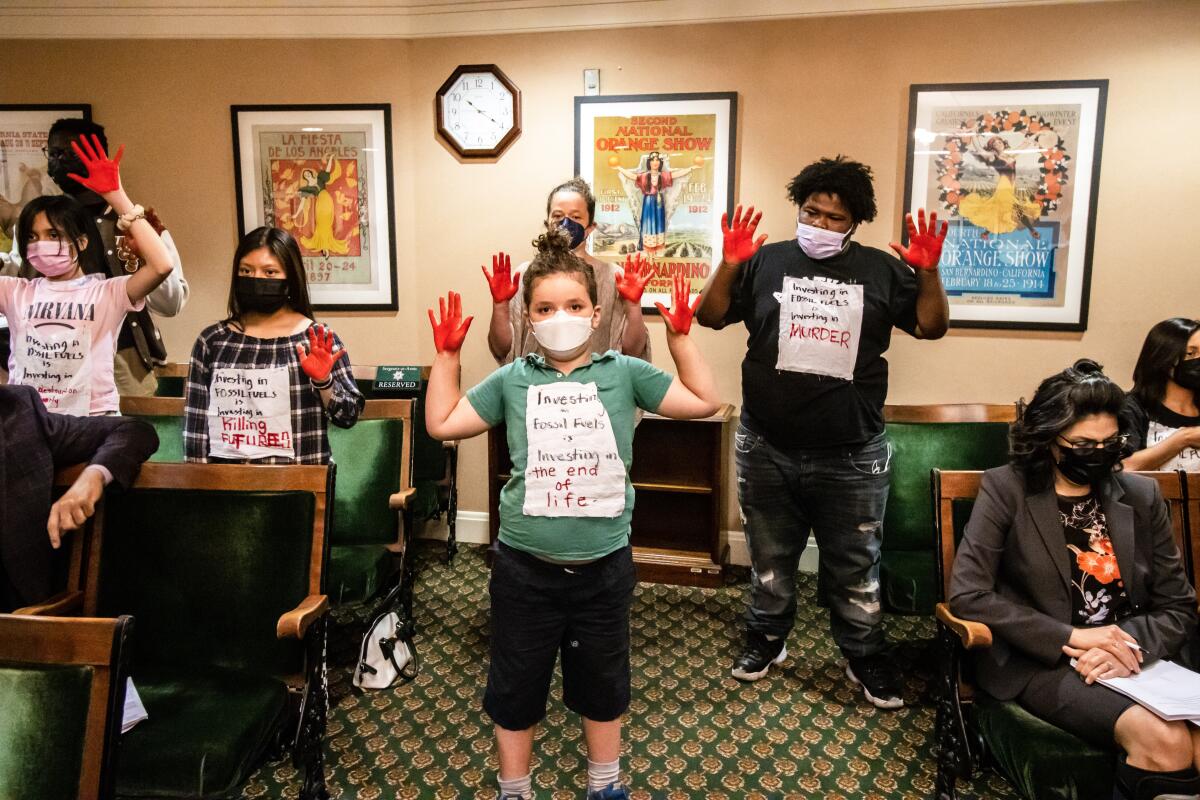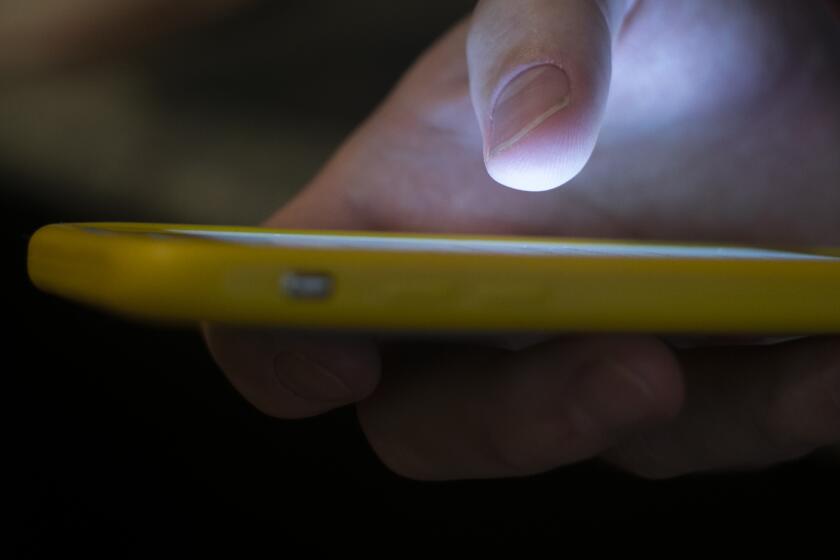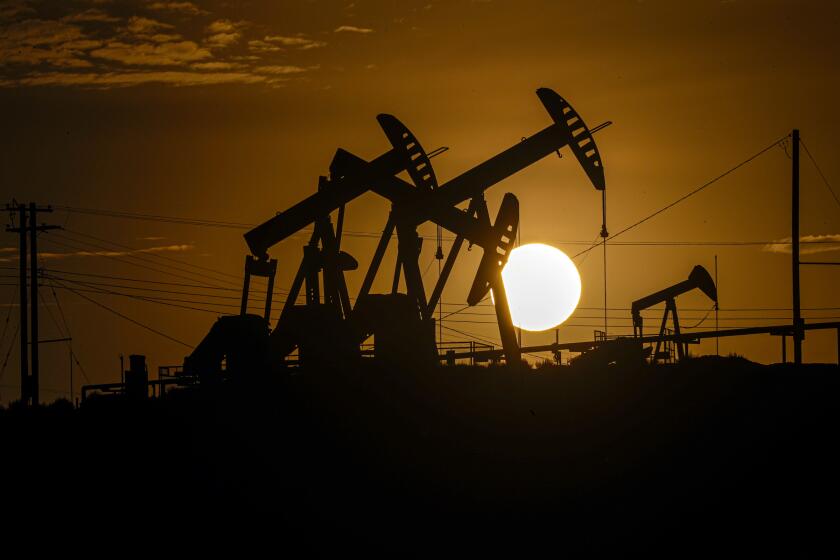Facing extreme heat and drought, young Californians cope to beat climate anxiety and doom

- Share via
When he was 6 years old, Sim Bilal began to have nightmares of floods pouring through his South Los Angeles home.
The bad dreams started when he first watched Al Gore’s “An Inconvenient Truth,” a seminal documentary about human-driven global warming, with his parents. For years, he struggled with severe anxiety over the fate of the planet. For a time, he would return from school and lie in bed, feeling powerless over the growing climate crisis.
“I’m not a very emotional person, but this is such a huge existential issue,” said Bilal, 20. “It’s really debilitating.”
As he learned more about what sea level rise would look like, he began to imagine what his city could become. Homes flooded, native trees withering in the heat, butterflies and bees facing extinction, widespread famine, dying crops in the Central Valley. Last summer he felt it was all coming to fruition with wildfires raging across the state, filling the skies with smoke for months.
In this era of drought, heat waves, wildfires and rising seas, young people are especially prone to falling into a sense of environmental doom, as they are coming of age when every year feels more dire. Experts call these feelings of despair climate anxiety, with symptoms that include panic attacks, insomnia, obsessive thinking and grief.
“Just seeing the effects of the climate crisis in real time, it’s even more scary,” said Bilal.
Many seek therapy, and a crop of specialists has risen to help people cope with environmental fears.
Mental health news and resources to help you cope with the stress of daily life, anxiety and more.
Others channel their worries into action. Across the country, young people have mobilized to urge elected leaders to confront the climate crisis and make it part of their platforms. They have held large protests and launched campaigns for legislation that endorse environment-friendly policies.
At 15, Bilal began getting involved with climate activist organizations and soon became an advocate in his community, joining the national organization Earth Guardians and later becoming a leader in Youth Climate Strike Los Angeles.
Bilal said organizing and finding a community of youth climate activists has been an “astronomical” help for his psyche. This year, Bilal disrupted a Los Angeles mayoral debate, at which he criticized candidates for lacking clear climate policy proposals in their campaign platforms. He said local youth climate activists are tapped into many local elections, driven by a sense of urgency that the crisis is worsening because of policy failures.
“For so long, it’s been sold to us as a future issue, and something we have to deal with in 2040, 2050,” he said.
A study published in the Lancet in December surveyed 10,000 people from 10 countries between the ages of 16 and 25 and found that 59% of respondents reported feeling very or extremely worried about climate change; 84% were at least moderately worried. The researchers, from the United States, Britain and Finland, also found that young people reported feeling betrayed and failed by their country’s government.
“Distress appears to be greater when young people believe that government response is inadequate, which leads us to argue that the failure of governments to adequately reduce, prevent or mitigate climate change is contributing to psychological distress, moral injury and injustice,” the researchers found. “Climate anxiety might not constitute a mental illness, but the realities of climate change alongside governmental failures to act are chronic, long-term, and potentially inescapable stressors.”
There are “real psychological harmful effects” on people who feel powerless when elected leaders do not address the climate crisis, said Britt Wray, human and planetary health postdoctoral fellow at Stanford University who co-wrote the study.
“Young people generally feel like adults have left the building on this issue, and are relatively belittled and ignored in terms of the angst that they feel about it,” Wray said.
Coping with climate anxiety can take many forms, said Lauren Traitz, an associate marriage and family therapist in Los Angeles who specializes in a growing field helping clients distressed about ecological disasters.
“Knowing it’s a collective issue, knowing we can’t possibly hold this stuff alone” is important, Traitz said.
She urges clients to seek out restorative work, like gardening or growing food in community gardens or their own yards. Something as simple as putting your feet or hands into the dirt can help individuals reconnect with the world.
Andra Brosh, a clinical psychologist and certified eco-therapist in Pasadena, said clients will come in with anxiety and depression without understanding where it stems from, and with a line of questioning she learns it can be traced to concern about destruction of the environment.
“It’s like a floodgate of relief on some level and also an opportunity to go deeper in a therapeutic process,” Brosh said.
Quick help for suicide thoughts and other mental health emergencies will soon be as easy as 9-8-8.
Niko, a 31-year-old Silver Lake resident, said he began therapy in 2020, feeling stressed at the situation with COVID-19. Being overweight, he said, made him feel more vulnerable to the coronavirus.
As he shared his fears and frustrations about the pandemic with his therapist over Zoom, he began to vent about the climate crisis as well. Niko, who did not want to use his last name, said he spoke about watching news segments dealing with climate change and having feelings of despair and anger. When calling for an Uber, he said, he cancels it unless it is an electric vehicle or eco-friendly car.
The sessions helped him gain a sense of hope, Niko said.
“He pointed out it doesn’t always have to be negative. Not everything has to be such a bad thing,” he said.
Niko said he is reminded of legislators pushing for a zero-carbon future, and young people, like environmental activist Greta Thunberg, advocating for change. Instead of watching news about pending catastrophe, he said, he reads about how other countries are successfully moving forward with environmental practices.
“It provides me with that hope that one day we can move in that direction,” he said.
For some youths, the only solution is to step up themselves.
Katerina Gaines, 17, spent part of her summer traveling with other teenagers and young adults to Sacramento to rally support for a state bill that would have divested state employees retirement funds from fossil fuel companies.
When she was a high school sophomore, Katerina began to worry that the Bay Area she grew up knowing would one day become unrecognizable, razed by wildfires and transformed by gentrification. She started attending climate demonstrations, at which she felt energized, and turned the dread about her future into advocacy work. She joined Youth vs. Apocalypse, an Oakland-based youth-led climate justice organization that offers educational presentations in Bay Area schools.
During this year’s legislative session, the organization joined other climate justice groups in support of Senate Bill 1173, which would have divested state retirement plans of more than $11 billion in fossil fuel companies by 2030.
But legislators ultimately failed to move it forward.
Despite knowing the bill failed to advance, youth climate activists gathered in Sacramento in June to protest. They held a demonstration inside the Capitol, and they painted their hands red to signify the “blood” on the hands of elected leaders, Katerina said.
“When politicians don’t support climate ambitious legislation, it literally feels like they’re saying, ‘We don’t care about your future, we don’t care about the planet.’ And that is incredible anxiety inducing,” she said.
Global heating is having dire effects on people and nature, the U.N. says, with urgent action needed to curb emissions and adapt to worsening effects.
Jesús Ramón Villalba Gastélum co-founded the Los Angeles chapter of Youth Climate Strike when he was 16, based in part on the upheaval climate change caused his family, who had to flee Sinaloa, Mexico, years ago, when endless drought devastated their crops. He fears the same conditions are descending on California.
Now 19, he works full time helping farmworkers while consulting with Bilal and other youth organizers in their efforts to persuade legislators to endorse eco-friendly legislation. But during the pandemic, he said, he felt burned out by the cause and its many losses. Climate and government inaction, along with the rising cost of living and being in the U.S. undocumented, produced a perfect storm of anxiety. But he had to keep going.
“We just know they’re not going to do anything if we don’t push them,” he said. “It’s a never-ending struggle.”
Hannah Estrada, the education and organizing coordinator for Youth vs. Apocalypse, said worsening climate conditions are concerning for vulnerable populations and what her own future holds.
Growing up in San Francisco, Estrada, 19, said she came to understand how residents in low-income Black and Latino communities face environmental racism, living in areas that are heavily polluted and lacking the infrastructure necessary to prepare for disasters. She feared this would only worsen with climate change.
“It’s hard to have an idea of what your future’s going to look like when there are wildfires and we’re having more droughts,” she said.
To cope, Estrada compartmentalizes, and focuses on school.
She is attending San Jose State University and intends to pursue a law degree. Sometimes, she said, she just has to “hope for the best.”
“My life is going to be normal or be super-disrupted by climate change,” she said. “Either way, I should go to college.”
More to Read
Toward a more sustainable California
Get Boiling Point, our newsletter exploring climate change, energy and the environment, and become part of the conversation — and the solution.
You may occasionally receive promotional content from the Los Angeles Times.














